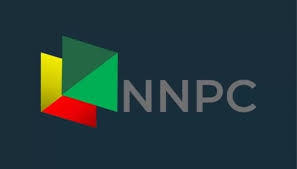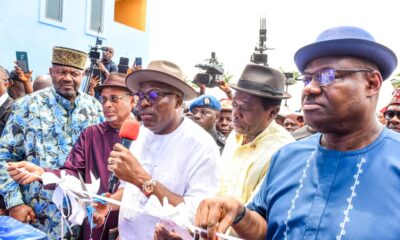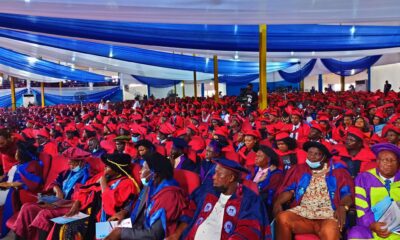Oil & Energy
2011And Nigeria’s Oil Industry
The year 2011 witnessed a very stormy weather that is yet to be cleared in the oil/gas and energy sector. Although the year came with great hopes and benefits as the President Goodluck Jonathan –led administration ensured that petroleum products and power supply were available for the people.
However, the controversial issue of removal of fuel subsidy beclouded scenario which is yet to be resolved or settled as Nigerians are not yet convinced as to how the funds saved from the subsidy will be used.
More than 50 years ago, Nigeria began to witness oil exploration and exploitation, which is being sustained till date. As the years roll by one is moved to reflect on the development of the oil and energy sector of the nation’s economy.
The uncommon fast movement or shift from agriculture to petroleum has enveloped the country and the gamble of the adventure is now paying off. The country is eventually achieving the great success of its life in the oil and energy sector. The satisfaction and fulfillment the nation is enjoying are mainly derived from oil and gas her God-given resources.
It is, however, one’s waning regrets that the sector is experiencing a seeming down shift due to managerial ineptitude. It was the oil and gas as well as energy success that made the country a cynosure of the world. The relative peace in the Niger Delta in 2011 created a suitable environment for oil companies to increase their outputs of crude oil production.
The year 2011 recorded some paradigm shifts from what obtained in the past. The Federal Government took measures toward the implementation of reforms in the oil-gas and power industries during the year.
In partnership with joint venture oil companies, there were renewed efforts at creating improved and sustainable community relations with host communities of oil-producing Niger Delta region to enhance oil production after the amnesty programme was put in place for former militants that terrorised the region.
For the first time, the government mustered courage and the will to privatise the power sector by handing over two power generation plants to private investors. It also went into some collaboration to explore development of the gas sector in a manner that would retain substantial value in the country. Although the impact of some of the decisions government took currently may not have been felt, operators are of the opinion that such steps were bold enough to bring a change in the oil/gas and energy sector.
Upstream
The inability of the National Assembly to pass the Petroleum Industry Bill (PIB) into law was a major setback in implementation of the reform in the upstream sector of the petroleum industry. Despite efforts of the executive arm of the government to persuade the National Assembly to pass the bill into law before the last general elections, the legislators sat on it and unit now, its passage is not in sight.
Most of the reforms expected in the upstream sector and their implementation processes are tied to the bill, hence further investments in the sector seemed to be at a standstill. Exploration activities last year were almost at zero level as international oil companies (IOCs) were skeptical over embarking on exploration as the PIB on passage into law might be very unfavourable since inputs in the bill became contentious, especially the fiscal regime and the issues on acreage development, which after several meetings between government and the IOCs, remained unresolved. The IOCs claim that the fiscal aspects of the bill, if passed into law in the current state, would make exploration and production business very unprofitable.
However, oil production improved last year on the heels of sustained amnesty programme of the government, rising to 2.4 million barrels per day, though the country was depending on importation of petrol. The development brought back Nigeria to its position as number one producer in Africa.
In 2011, Shell Petroleum Development Company (SPDC) embarked on routine maintenance of the Bonga Floating, Production, Storage and Offloading (FPSO) vessel, which is used to produce oil from shell’s biggest oil field, Bonga field in Oil Mining License (OML) 118 with daily oil production in excess of 200,000 barrels. The Bonga FPSO was shut down in compliance with the requirement for maintenance. Also last year, Shell Nigeria Exploration and Production Company Limited (SNEPCo) found the source of oil leak from its Bonga asset offshore Nigeria.
Shell successfully sold its asset in Oil Mining License (OML.40) out of four blocks, which have been put on sale since 2010. Elcrest, a consortium of two firms comprising Eland and Starcrest emerged the preferred bidder for the oil blocks. Sale of Blocks 30, 34 and 42 is still being discussed with potential buyers.
Last year, the Nigeria National Petroleum Corporation (NNPC) and its joint venture partners, Shell, Nigeria Agip Oil company (NAOC), Total and ConocoPhillips, agreed to resume the execution of Bisemi – Samnabri Utilisation and unit Operating Agreement (UUOA), which was originally signed 19 years ago. The MOU would serve as a boost to the Gas Revolution Agenda. This agreement represents a significant step in the drive to support federal government’s (gas based) economic development aspiration as well as gas supply plan to facilitate investment decision on Brass LNG. The handover of operatorship of Egbema, Egbema-West and Ugada fields to the Nigerian Petroleum Development Company (NPDC), a subsidiary of NNPC, was completed also last year. The move was designed to further build up capacity of NPDC as a national upsetream company.
Downstream
The downstream operation, particularly the products marketing sector was substantially stable as the government and other operators of the sector were able to sustain supply and check scarcity. Besides insignificant scarcity occurrence in the first quarter of last year, which did not last a day, the market was flooded with petroleum products, although almost 100 percent of the supply was import – dependent.
The independent Petroleum Marketers Association of Nigeria (IPMAN), a major stakeholder in the downstrcan operation, early last year, had a problem within itself and got factionalised. One group pulled out from the company, NIPCO, where it has equity stakes and chose capital oil and gas limited as its base for receipt of products and conduct of other transactions.
Contrary to reports that politically –induced violence and anticipated resumption of militant attacks might adversely affect oil production last year, NNPC ensured that oil and gas industry operations and oil output were stable and improved upon, shooting production up to 2.3 million barrels per day (bpd) after dropping to a low of 1.7 million bpd in mid – 2009.
A British High Court last year in London ordered the Shell Petroleum Development Company to pay compensation of more than $250 million ($410 million) to Bodo community in Rivers State after the company admitted liability for two oil spills in the community. Shell acknowledged that the two spills in 2008, were caused by operational failure.
In 2011, the statistician –General of the Federation said last year’s third quarter Gross Domestic Product (GDP) declined from 7.86 per cent in 2010 to 7.40 per cent and attributed the 0.46 per cent decline in growth to a fall in oil production by 0.34 percent in the third quarter as opposed to 5.08 percent in 2010.
Crude oil production with its associated gas component, for example, fell from 2.49 million barrels per day (mbpd) on average in the second quarter of 2011 to 2.36 mbpd on average in the third quarter. The drop in crude oil production in 2011 was as a result of operational constraints experienced by some of the major oil producers during the period under review.
In the third quarter of 2011, the organisation of Petroleum Exporting Countries (OPEC) agreed that first new production limit in three years in a deal that settled a six-month-old argument over output levels in Saudi Arabua’s favour. OPEC agreed a new supply target of 30 million barrels per day, which is roughly in line with current production.
The agreement caps output for all 12 OPEC members for the first half of the year, keeping supply near three-year highs, which is enough to build lean global inventories. When OPEC met in June last year, it failed to reach all agreement on higher supplies, leaving Saudi Arabia free to open the taps to compensate for lost Libyan supply.
Midstream
The Federal Government had in 2010 through NNPC agreed to partner with China State Construction Engineering Corporation (CSCEC), state governments of Lagos, Kogi and Bayelsa for the construction and operation of Greenfield Refinery in the three States. The refineries were designed to have a combined refining capacity of about 750,000 barrels per day, employ about 7,000 workers and planned to be jointly financed by NNPC, the state governments where they would be sited and the Chinese firms.
The government aggressively spearheaded moves for the take-off of the project in first quarter of last year but throughout the year, nothing was heard of the project until in October when the president in his Independence anniversary broadcast reiterated the federal government determination to build three new refineries. Considering the seriousness given to the project in 2010, which involved signing of MOUs and some milestones marked to be achieved within 2011, industry stakeholders and Nigerians were surprised that virtually nothing was done.
The existing refineries have been working, if at all, below 20 percent of installed capacities, although government sources said the four refineries work at 30 percent installed capacity. The private refineries including the Rivers State Treasure Oil Resources and the Amakpe refinery in Akwa Ibom State which were billed to come on stream last year had been in the cooler throughout the year.
Shedie Okpara
Oil & Energy
FG, MEMAN Chart Ways To Safe Petroleum Products Delivery

The Federal Government and key Petroleum Products marketers have proposed new measures to help curb rising cases of road accidents involving petrol tankers.
This followed recent incidents of road accidents resulting in cremation of hundreds of lives and causing extensive damage to properties.
Speaking at the Discourse organised by Mejor Energy Marketers Association of Nigeria (MEMAN) in Lagos, Thursday, with the theme “Improving Safe Transportation of Petroleum Products”, the Minister of State for Petroleum Resources (Oil), Heineken Lokpobiri, noted with dismay the number of casualties the country recorded recently due to tanker accidents.
Lokpobiri stressed the need for an enhanced training for tanker drivers, installation of detection leak devices as well as other safety systems that can assist drivers.
He called on Marketers and Federal Road Safety Commission (FRSC) to strengthen collaboration with stakeholders, especially in the training of tanker drivers.
On his part, the Minister of State for Petroleum Resources (Gas), Ekperikpo Ekpo, reaffirmed government’s commitment to providing enabling environment to ensure safety of petroleum products transportation.
Ekpo, who was represented by Engr. Abel, said consideration should be given to more safety means of transporting products like the pipelines and railway line.
He stressed the need for better training for drivers and implementation of safety regulations within the industry.
Earlier, Chairman, MEMAN, Huub Stokman, said the Association has elaborate training manual for members truck drivers.
Stokman insisted that more training programmes and consistent adherence to safety measures would help to curb road accidents involving tanker drivers.
Also speaking, the National President, Nigerian Association of Raod Transport Owners (NARTO), Yusuf Lawal Othman, called for support.
Oil & Energy
Benue To Pioneer Gas Production From Coal – NGEP

The Chairman, National Gas Expansion Programme (NGEP), Prof. Mohammed Ibrahim, has said that the production of coal bed methane, an unconventional form of natural gas extracted from coal, is set to begin in Benue State.
Prof. Ibrahim staed this while addressing newsmen at the end of a joint meeting of the National and State gas expansion committees with Benue State Governor, Hyacinth Alia.
He said the Federal Government is committed to expanding gas availability in Nigeria for domestic use and mobility.
Ibrahim added that extracting gas from unconventional coal sources rather than traditional hydrocarbon reserves is a way to boost gas availability.
“Essentially there are four areas of implementation that the committee has identified. One is to pioneer the production of gas from what you call coal bed methane, which means that Benue is going to pioneer in the country the production of gas not from conventional hydrocarbon, but from non-conventional coal just so that the nation will have an alternative source to gas availability”, he said.
Also speaking, the Chairman, Benue State Gas Expansion Programme, Dr. Emmanuel Chenge, said the gas expansion initiative would contribute to the economic transformation of Benue State.
“The good news is that Benue is set to join the league of gas-producing states and if we are conversant with what being a member of the gas-producing state is, it shows that Benue State will start getting derivatives from that sector of the economy”, Dr Chenge stated.
The National Gas Expansion Programme (NGEP) was established to boost the exploration and utilisation of gas in Nigeria and make Nigeria a gas-based industrial nation by increasing the use of gas for transportation, cooking, and industrialization.
Oil & Energy
NNPC Debunks Explosion Claim In Warri Refinery

The Nigeria National Petroleum Company Limited (NNPCL) has said there was no explosion at the newly refurbished Warri Refining and Petrochemical Company (WRPC).
NNPCL’s Chief Corporate Communications Officer, Olufemi Soneye, made this known in a statement issued on Friday night.
Soneye said reports claiming that there was an explosion at the Warri refinery were false and should be ignored and disregarded by the public.
According to him, the refinery was undergoing routine maintenance.
His statement read, “NNPC Ltd. wishes to clarify that there was no explosion at the Warri Refining and Petrochemical Company (WRPC). Any reports suggesting otherwise are completely false.
“On January 25, 2025, operations at WRPC Area 1 were intentionally curtailed to carry out necessary intervention works on select equipment, including field instruments that were impacting sustainable and steady operations.
“These intervention works are essential to ensure the production of on-specification finished and intermediate products, particularly Automotive Gas Oil (AGO) and Kerosene (Kero).
“The routine maintenance is progressing as planned, and Area 1 will be back in operation within the next few days.
“Despite ongoing interventions, over the past 11 days, AGO loading has been maintained at an average of eight trucks per day, with a sufficient supply available to sustain ongoing truck load-out operations”.
Soneye added that the NNPCL was committed to ensuring an uninterrupted supply of petroleum products from the refinery.
He said the company “appreciates the patience and cooperation of all stakeholders as it completes these essential maintenance activities”.
-

 Featured5 days ago
Featured5 days agoIYC Expresses Concerns Over Political Tension In Rivers
-

 News5 days ago
News5 days agoOur Govt’ll Eventually Triumph, Fubara Assures Rivers People …Inaugurates Govt House Staff Quarters
-
Business5 days ago
Operator Hopes For Improved Airline Operations Through Afrexim Bank
-
Opinion5 days ago
That NANS’ Induction Of Former Tai LG Boss
-

 News5 days ago
News5 days agoFubara Approves Immediate Construction Of Hotels, Admin Block, Others At IAUE
-
Sports5 days ago
ECOWAS Marathon: Nigerians win 5km
-
Rivers5 days ago
‘SMEs Growth, Key To Poverty Alleviation In Nigeria’
-

 Nation5 days ago
Nation5 days agoMonarch’s Coronation Excites Aluu People

